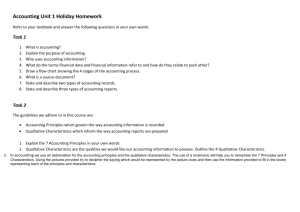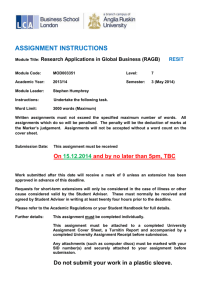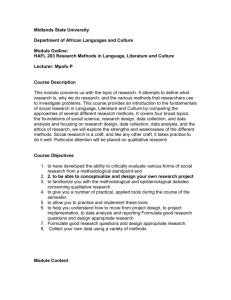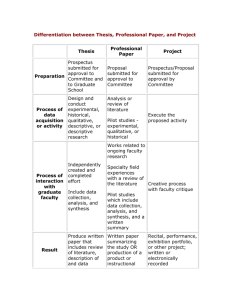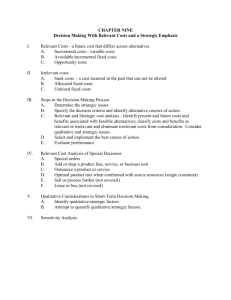Course Syllabus EDUC 817
advertisement
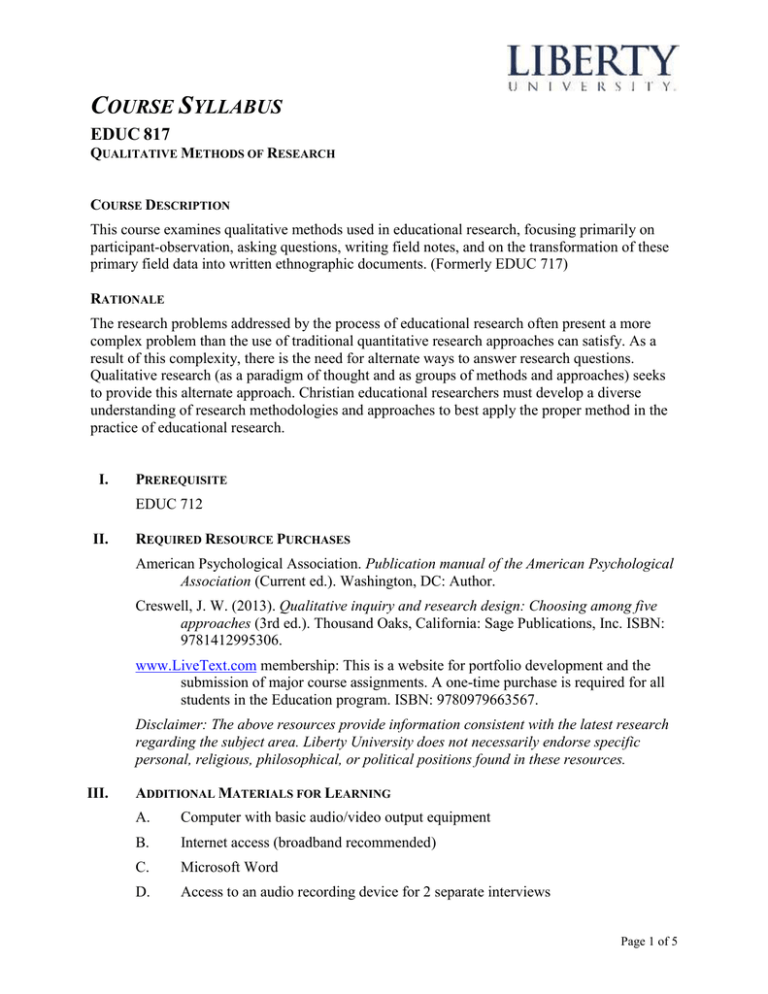
EDUC 817 Course Syllabus COURSE SYLLABUS EDUC 817 QUALITATIVE METHODS OF RESEARCH COURSE DESCRIPTION This course examines qualitative methods used in educational research, focusing primarily on participant-observation, asking questions, writing field notes, and on the transformation of these primary field data into written ethnographic documents. (Formerly EDUC 717) RATIONALE The research problems addressed by the process of educational research often present a more complex problem than the use of traditional quantitative research approaches can satisfy. As a result of this complexity, there is the need for alternate ways to answer research questions. Qualitative research (as a paradigm of thought and as groups of methods and approaches) seeks to provide this alternate approach. Christian educational researchers must develop a diverse understanding of research methodologies and approaches to best apply the proper method in the practice of educational research. I. PREREQUISITE EDUC 712 II. REQUIRED RESOURCE PURCHASES American Psychological Association. Publication manual of the American Psychological Association (Current ed.). Washington, DC: Author. Creswell, J. W. (2013). Qualitative inquiry and research design: Choosing among five approaches (3rd ed.). Thousand Oaks, California: Sage Publications, Inc. ISBN: 9781412995306. www.LiveText.com membership: This is a website for portfolio development and the submission of major course assignments. A one-time purchase is required for all students in the Education program. ISBN: 9780979663567. Disclaimer: The above resources provide information consistent with the latest research regarding the subject area. Liberty University does not necessarily endorse specific personal, religious, philosophical, or political positions found in these resources. III. ADDITIONAL MATERIALS FOR LEARNING A. Computer with basic audio/video output equipment B. Internet access (broadband recommended) C. Microsoft Word D. Access to an audio recording device for 2 separate interviews Page 1 of 5 EDUC 817 Course Syllabus IV. MEASURABLE LEARNING OUTCOMES Upon successful completion of this course, the candidate will be able to: V. A. Define qualitative research and identify the criticism of this methodology. B. Distinguish between quantitative and qualitative research. C. Identify some of the different types of qualitative research. D. Identify ethical issues associated with qualitative research. E. Critique articles that use qualitative methods. F. Write a qualitative research plan. G. Describe ways qualitative inquirers gather data. H. Delineate five major qualitative inquiry approaches. I. Write field notes based on participant observations. J. Describe the general procedures followed in the analysis of qualitative data. K. Successfully implement current APA writing guidelines. L. State some of the criteria to use in evaluating a qualitative study. M. Identify the components of a qualitative report. N. Write a qualitative research prospectus. COURSE REQUIREMENTS AND ASSIGNMENTS A. Textbook readings and presentations B. Course Requirements Checklist After reading the Course Syllabus and Student Expectations, the student will complete the related checklist found in Module/Week 1. C. Class Introductions In Module/Week 1, the candidate will create a brief personal biography introducing himself/herself to the instructor and to the rest of the class. This brief biography must include the degree that the candidate is pursuing and the candidate’s current job. The candidate may add any other details that he/she wishes. D. Discussion Board Forums (7) Discussion boards are collaborative learning experiences. Therefore, the candidate will complete Discussion Board Forums in 2 parts. First, the candidate must submit a thread in response to the provided prompt. Then, the candidate must reply to the threads of 2 classmates. Page 2 of 5 EDUC 817 Course Syllabus E. Reading Summary The candidate will have the opportunity to practice his/her APA writing and formatting skills through composing clear and concise chapter summaries for his/her assigned reading that module/week. The summaries must follow the format provided in the course and must clearly reflect current APA style and writing. F. Research Plan Overviews Throughout the course, the candidate will build a preliminary research plan that will submitted in 4 different stages. Once completed, this plan will be the template for the final research prospectus. G. Five Approaches Table The candidate will complete a chart that will allow him/her to define, explain, and discuss 5 major qualitative research methods. H. Article Critiques (2) The candidate will read and critique an article based on the information provided in Chapter 5 and the appendices of the textbook. The critique must be a doublespaced review of the study’s purpose, theory, methods, and major findings. Both critiques must also follow current APA style and must match the formatting guidelines provided. I. Field Notes Interviews The candidate will practice collecting data in the field through conducting 2 interviews with individuals who have earned a doctorate degree in the field of education. Each interview must be kept at about a 1-hour time limit and must be audio recorded for official transcription, which will be submitted. An interview template is provided with a detailed list of questions. J. Research Prospectus The candidate will prepare a Research Prospectus based on his/her research plan, reading, and coursework. A draft of the Research Prospectus will be submitted through the Research Prospectus Draft Check SafeAssign link. SafeAssign is a plagiarism detection tool that will allow the candidate to view the originality reports for his/her papers and make revisions as necessary before the final version is due. Page 3 of 5 EDUC 817 Course Syllabus VI. COURSE GRADING AND POLICIES A. Points Course Requirement Checklist Discussion Board Forums (7 at 30 ea) Reading Summary Research Plan Overviews (4 at 60 ea) Five Approaches Table Article Critiques (2 at 50 ea) Field Notes Interviews Research Prospectus Draft Check Research Prospectus Total B. 10 210 50 240 50 100 100 50 200 1010 Scale A = 960–1010 A- = 940–959 B+ = 920–939 B = 890–919 B- = 870–889 C+ = 850–869 C = 820–849 C- = 800–819 D+ = 780–799 D = 750–779 D- = 730–749 F = 0–729 C. LiveText Submission Policy Assignments that are to be submitted to LiveText must be submitted there in order to receive credit for them. This includes assignments that are also submitted in Blackboard, including those submitted to SafeAssign. D. Late Assignment Policy If the student is unable to complete an assignment on time, then he or she must contact the instructor immediately by email. Assignments that are submitted after the due date without prior approval from the instructor will receive the following deductions: 1. Late assignments submitted within one week of the due date will receive a 10% deduction. 2. Assignments submitted more than one week late will receive a 20% deduction. 3. Assignments submitted two weeks late or after the final date of the course will not be accepted. 4. Late Discussion Board threads or replies will not be accepted. Special circumstances (e.g. death in the family, personal health issues) will be reviewed by the instructor on a case-by-case basis. Page 4 of 5 EDUC 817 Course Syllabus E. Plagiarism Policy According to the plagiarism policy available through Liberty University’s Student Expectations, plagiarism may result in failing the course with an FD (Failed Dishonesty). Plagiarism on any project will automatically result in a zero. See the APA manual for information about plagiarism and how it is defined. Additionally, academic misconduct includes not only plagiarism, but academic dishonesty falsification. See Student Expectations for detailed information regarding the plagiarism policies of Liberty University. F. Disability Assistance Students with a documented disability may contact Liberty University Online’s Office of Disability Academic Support (ODAS) at LUOODAS@liberty.edu to make arrangements for academic accommodations. Further information can be found at www.liberty.edu/disabilitysupport. Page 5 of 5
